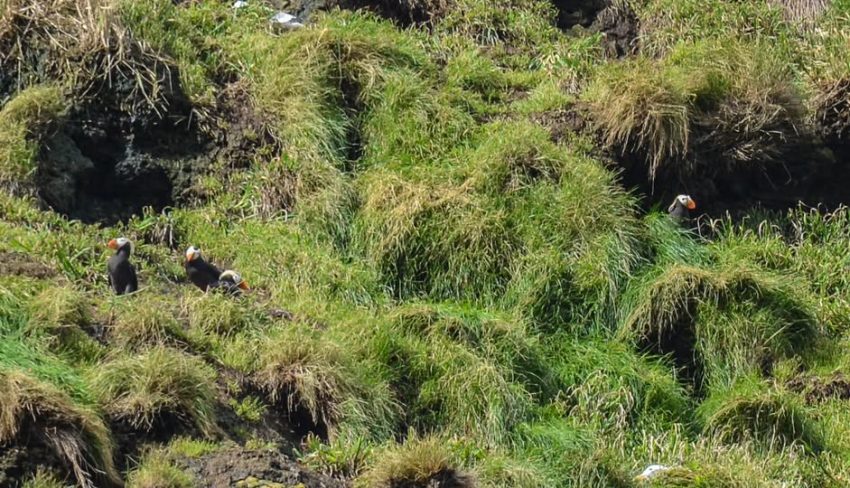Haystack Rock Awareness Program & Friends of Haystack Rock
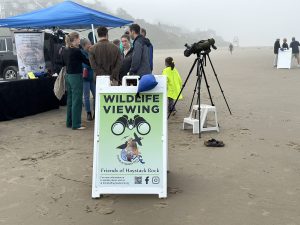
What: Welcome the Puffins Celebration
When: Sunday, April 13th, 2025
Where: Haystack Rock, Cannon Beach, Oregon
The Haystack Rock Awareness Program is happy to announce our Annual Welcome the Puffins Celebration happening on Sunday April 13th in partnership with the Friends of Haystack Rock. Come join us at Haystack Rock, rain or shine, from 8am to 10am to celebrate the seasonal return of Tufted Puffins to their nesting grounds. Our talented team of interpreters will be sharing binoculars and scopes to visitors and teaching them how to spot our circus friends among the other nesting sea and shore birds. Expect an educational fun-filled morning for kids with a Tufted Puffin activity table and our interactive Tufted Puffin Predator Game where children can learn about the many natural and anthropogenic challenges nesting puffins face when raising their young. Can’t make it in person? Then follow along with the fun on our Facebook and Instagram Live accounts. We hope to see you on the beach!
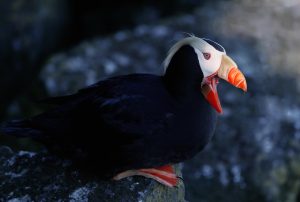
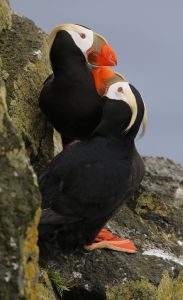
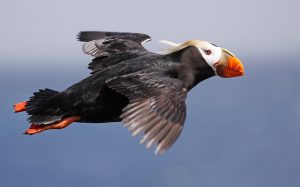 Tufted Puffins in Oregon are experiencing a drastic decline. In 1988, US Fish and Wildlife (USFWS) estimated approximately 4,858 birds in Oregon; in 2021, that number was just 553. At Haystack Rock in Cannon Beach — the 2nd largest colony in Oregon, and one of the easiest places in the northwest to see Tufted Puffins during their breeding season – there has been a noticeable drop in the number of birds returning. Data collected annually by USFWS staff and volunteers highlight the alarming decline of the iconic seabird at the rock, from 400 birds in 1978 to just 102 in 2024. In response to the decline, National Audubon Society’s Seabird Institute – with support from Friends of Haystack Rock – created a new position to support coordination among various key players and to help leverage the limited available resources for Tufted Puffin conservation in their southern range, with an emphasis on Oregon. A new working group with representation from Friends of Haystack Rock, Haystack Rock Awareness Program, National Audubon Society, Bird Alliance of Oregon, USFWS, Oregon Department of Fish and Wildlife, Oregon State University,, Shoreline Education for Awareness, American Bird Conservancy, and others is collaboratively creating a list of priority actions to employ towards meeting a 10-year goal of ‘halting the decline.’ The strategies being discussed include not only on-the-ground conservation projects, but also outreach, education, and engagement.
Tufted Puffins in Oregon are experiencing a drastic decline. In 1988, US Fish and Wildlife (USFWS) estimated approximately 4,858 birds in Oregon; in 2021, that number was just 553. At Haystack Rock in Cannon Beach — the 2nd largest colony in Oregon, and one of the easiest places in the northwest to see Tufted Puffins during their breeding season – there has been a noticeable drop in the number of birds returning. Data collected annually by USFWS staff and volunteers highlight the alarming decline of the iconic seabird at the rock, from 400 birds in 1978 to just 102 in 2024. In response to the decline, National Audubon Society’s Seabird Institute – with support from Friends of Haystack Rock – created a new position to support coordination among various key players and to help leverage the limited available resources for Tufted Puffin conservation in their southern range, with an emphasis on Oregon. A new working group with representation from Friends of Haystack Rock, Haystack Rock Awareness Program, National Audubon Society, Bird Alliance of Oregon, USFWS, Oregon Department of Fish and Wildlife, Oregon State University,, Shoreline Education for Awareness, American Bird Conservancy, and others is collaboratively creating a list of priority actions to employ towards meeting a 10-year goal of ‘halting the decline.’ The strategies being discussed include not only on-the-ground conservation projects, but also outreach, education, and engagement.
“As important as it is that we continue to take action to protect the Tufted Puffin in Oregon, it’s also important for people to better understand why protecting this amazing seabird is so important”, said Katherine Luscher, Tufted Puffin Coordinator with Audubon’s Seabird Institute. “Events like Welcome Puffin at Cannon Beach allow us to build more community support and engagement for protecting puffins and other seabirds. Plus, you can’t not smile when you see one for the first – or fifty-first time.”
In early April puffins arrive at Haystack Rock. Most already have a lifelong partner and are returning to the same protected burrow they used last year to raise their young. Tufted Puffins spend about 16 weeks at the rock. For the first couple weeks the puffins stake out their territory and clean up their burrow.
Once their burrow is ready, the female puffin lays a single, chicken-sized egg, and both sexes take turns incubating it. Incubation lasts between about 43 days. Though usually tucked inside the burrow, newly hatched puffins make appearances at the ‘Rock’ beginning in late June through mid to late August.
You may not be able to see the pufflings because activity around the rock is hectic and plentiful. But it’s fun to watch parent puffins making multiple trips to their burrow with bills full of fish for their growing puffling.
Pufflings leave their burrows 38 to 59 days after hatching. Under the protection of dark (to escape the ever-watchful, hungry eyes of bald eagles), all the pufflings will leave the safety of the rock and return to the open ocean, where they will spend the winter with no parental care.
Learn more about the plight of the Tufted Puffin or to donate to the cause visit, Puffins | Friends of Haystack Rock
Tufted Puffin photographs Ram Papish.

